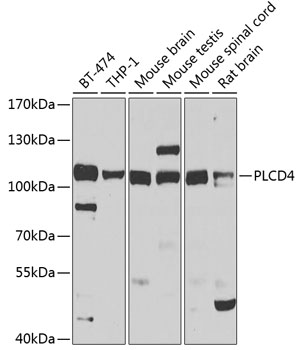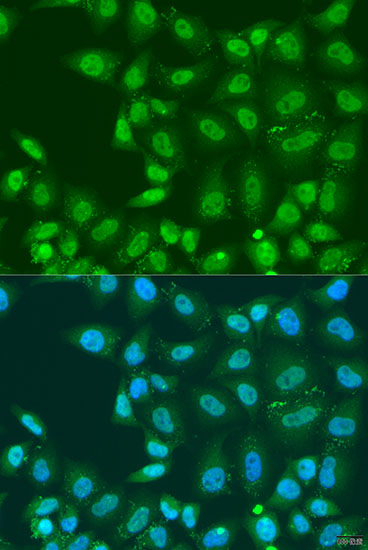-
Product Name
PLCD4 Polyclonal Antibody
- Documents
-
Description
Polyclonal antibody to PLCD4
-
Tested applications
WB, IF
-
Species reactivity
Human, Mouse, Rat
-
Alternative names
PLCD4 antibody; phospholipase C delta 4 antibody
-
Isotype
Rabbit IgG
-
Preparation
Antigen: Recombinant fusion protein containing a sequence corresponding to amino acids 1-290 of human PLCD4 (NP_116115.1).
-
Clonality
Polyclonal
-
Formulation
PBS with 0.02% sodium azide, 50% glycerol, pH7.3.
-
Storage instructions
Store at -20℃. Avoid freeze / thaw cycles.
-
Applications
WB 1:500 - 1:2000
IF 1:50 - 1:200 -
Validations

Western blot - PLCD4 Polyclonal Antibody
Western blot analysis of extracts of various cell lines, using PLCD4 antibody at 1:1000 dilution.Secondary antibody: HRP Goat Anti-Rabbit IgG (H+L) at 1:10000 dilution.Lysates/proteins: 25ug per lane.Blocking buffer: 3% nonfat dry milk in TBST.Detection: ECL Basic Kit .Exposure time: 30s.

Immunofluorescence - PLCD4 Polyclonal Antibody
Immunofluorescence analysis of U2OS cells using PLCD4 antibody at dilution of 1:100. Blue: DAPI for nuclear staining.
-
Background
Hydrolyzes the phosphatidylinositol 4,5-bisphosphate (PIP2) to generate 2 second messenger molecules diacylglycerol (DAG) and inositol 1,4,5-trisphosphate (IP3). DAG mediates the activation of protein kinase C (PKC), while IP3 releases Ca(2+) from intracellular stores. Required for acrosome reaction in sperm during fertilization, probably by acting as an important enzyme for intracellular Ca(2+) mobilization in the zona pellucida-induced acrosome reaction. May play a role in cell growth. Modulates the liver regeneration in cooperation with nuclear PKC. Overexpression up-regulates the Erk signaling pathway and proliferation.
Related Products / Services
Please note: All products are "FOR RESEARCH USE ONLY AND ARE NOT INTENDED FOR DIAGNOSTIC OR THERAPEUTIC USE"
